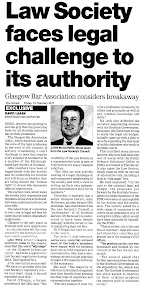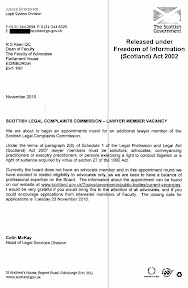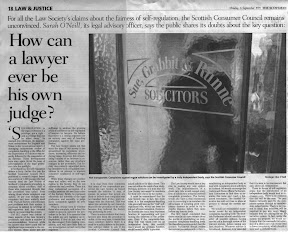 Petitions Committee raised questions over high profile Law Society resignation. CLAIMS from a leading lawyer the Law Society of Scotland has “a fundamental dishonesty at its core” which were made by former Glasgow Bar Association (GBA) President John McGovern who spectacularly resigned last week from the ruling Council of the Law Society of Scotland, have been raised at the Scottish Parliament’s Petitions Committee who are currently considering a petition Petition PE1388, which calls for the repeal of the Solicitors (Scotland) Act 1980 and an end to lawyers investigating complaints against themselves.
Petitions Committee raised questions over high profile Law Society resignation. CLAIMS from a leading lawyer the Law Society of Scotland has “a fundamental dishonesty at its core” which were made by former Glasgow Bar Association (GBA) President John McGovern who spectacularly resigned last week from the ruling Council of the Law Society of Scotland, have been raised at the Scottish Parliament’s Petitions Committee who are currently considering a petition Petition PE1388, which calls for the repeal of the Solicitors (Scotland) Act 1980 and an end to lawyers investigating complaints against themselves.
 Scottish Law Reporter’s report on McGovern resignation amid Law Society dishonesty claims. It was reported earlier this week by Scottish Law Reporter, quoting reports from the independent law publication “The Firm” that former GBA President John McGovern had resigned from the Law Society of Scotland’s Council after a string of disagreements with the Law Society on everything from alternative business structures to the Society’s role over representation of solicitors & complaints handling. Mr McGovern apparently accused the Law Society of being “fundamentally dishonest at its core”, something many individuals from clients to journalists to politicians who have come into contact with the Law Society over regulation issues, have known for years.
Scottish Law Reporter’s report on McGovern resignation amid Law Society dishonesty claims. It was reported earlier this week by Scottish Law Reporter, quoting reports from the independent law publication “The Firm” that former GBA President John McGovern had resigned from the Law Society of Scotland’s Council after a string of disagreements with the Law Society on everything from alternative business structures to the Society’s role over representation of solicitors & complaints handling. Mr McGovern apparently accused the Law Society of being “fundamentally dishonest at its core”, something many individuals from clients to journalists to politicians who have come into contact with the Law Society over regulation issues, have known for years.
According to Scottish Law Reporter, The Firm’s website reported on the 16th February 2011 : “John McGovern, the former President of the Glasgow Bar Association and Law Society Council member for Glasgow and Strathkelvin resigned from the Law Society Council last night, claiming the Society has "a fundamental dishonesty at its core". He has resigned with immediate effect.”
The report goes onto say : “McGovern, who was elected to Council in May last year, has been critical of the Society's policy on ABS, and has campaigned against the dual functions of representation and regulation being vested in the Society, amongst other issues.”
 The Herald newspaper reported on a possible legal challenge to the Law Society’s authority. A few days later in the in the Herald newspaper on 18 February, it was reported the Glasgow Bar Association may mount a legal challenge to the Law Society’s requirements solicitors be a member before they can practice law and within the Herald’s story, David O’Hagan, a former president of the GBA was quoted as saying : “The credibility of the Law Society as a representative body is now at rock bottom for many Glasgow solicitors. The GBA are now actively looking at a legal challenge to end compulsory membership of the society and with a view to setting up their own independent representative body for its members.”.
The Herald newspaper reported on a possible legal challenge to the Law Society’s authority. A few days later in the in the Herald newspaper on 18 February, it was reported the Glasgow Bar Association may mount a legal challenge to the Law Society’s requirements solicitors be a member before they can practice law and within the Herald’s story, David O’Hagan, a former president of the GBA was quoted as saying : “The credibility of the Law Society as a representative body is now at rock bottom for many Glasgow solicitors. The GBA are now actively looking at a legal challenge to end compulsory membership of the society and with a view to setting up their own independent representative body for its members.”.
However, any hope the GBA might strike a blow for consumer protection seems to have ebbed away by the time the papers reported the story, after a spokesman for the Glasgow Bar Association, also quoted in the Herald story said : “We have no problem with the Law Society’s regulatory role – we just don’t think it should represent us as well.”
So it would appear while the Glasgow Bar Association may not be happy their solicitors must be members of the Law Society of Scotland to practice, the GBA happily accepts the Law Society’s highly prejudicial anti-consumer role over regulation of complaints, where lawyers investigate their own colleagues. If Mr McGovern’s reported claims of dishonesty at the Law Society are to be believed, this amounts to a clear case of double standards or perhaps do as I say, not as I do.
After the lurid headlines where clearly it seems to have been acknowledged from within the ever self-interested legal profession itself the Law Society is indeed, rotten to the core, campaigners who have lodged a petition at the Scottish Parliament calling for the repeal of the Solicitors (Scotland) Act 1980, the legislation which gives the Law Society of Scotland powers to self-regulate complaints against its own members, drew the now very public argument between the Glasgow Bar Association & the Law Society to the attention of MSPs, who raised the issue at this week’s Petitions Committee meeting.
Petition PE1388 : John Wilson MSP raised issue of lurid headlines over Law Society resignation at Holyrood’s Petitions Committee (click image to view video)
As the debate proceeded, there was an initial attempt to close the petition by Bill Butler MSP (Scottish Labour), who felt the Scottish Government would not budge from their position of refusing to repeal the Solicitors (Scotland) Act 1980, due to the “very precise terms of the petition”,
Another member of the Petitions Committee, John Wilson MSP (SNP) then raised the very public reports of John McGovern’s resignation saying he “.. thought it might be worthwhile writing to the Government seeking its views on the resignation of the individual and the headlines which were associated with that resignation, should raise concern with many people because of the allegations that have been made”
John Wilson continued : “I would like to continue this petition and ask the Scottish Government what action or what its views are in relation to the public statements made by a leading member of the Glasgow Bar Association in relation to this issue because clearly the petitioner has raised a number of issues and the Scottish Government have responded to the petitioner but given the situation in the last week in terms of the public statements that have been made I think there is a need to continue this petition and seek assurances from the government that they are looking into this matter and in particular the allegations that have been made by the individual who resigned.”
Bill Butler commented after hearing John Wilson’s comments he had no objection to the petition being continued in the terms which Mr Wilson had described. Petitions Committee Convener, Rhona Brankin MSP then asked that a prompt response be obtained by email from the Scottish Government, who duly obliged with a letter dated the next day, 23 February.
In the words of a Holyrood insider who passed a copy of the [now published] Scottish Government’s response to Diary of Injustice, Justice Department officials have apparently misled the Petitions Committee over the resignation of Mr McGovern, withholding any mention of media reports directly mentioning Mr McGovern’s claim the Law Society had “a fundamental dishonesty at its core”.
 Scottish Government letter omitted the now very public allegations the Law Society are dishonest, claimed regulation of crooked lawyers is robust ! The Scottish Government’s response to the Petitions Committee, signed by Jill Clark from the Legal System Division, states : “We understand that Mr McGovern has stood down from the Law Society’s Council and not the Law Society itself. According to press reports this was because he was unhappy with the society’s role in negotiating legal aid fees. Mr McGovern has obviously made a personal decision and the Scottish Government has no comment to offer on the reported reasons for his resignation. It is not clear why this resignation would have any implications for our position on this petition. The Scottish Government is of the view that there is a robust system of regulation in place for the legal profession and that our position remains as set out in our earlier reply of 1 February 2011.”
Scottish Government letter omitted the now very public allegations the Law Society are dishonest, claimed regulation of crooked lawyers is robust ! The Scottish Government’s response to the Petitions Committee, signed by Jill Clark from the Legal System Division, states : “We understand that Mr McGovern has stood down from the Law Society’s Council and not the Law Society itself. According to press reports this was because he was unhappy with the society’s role in negotiating legal aid fees. Mr McGovern has obviously made a personal decision and the Scottish Government has no comment to offer on the reported reasons for his resignation. It is not clear why this resignation would have any implications for our position on this petition. The Scottish Government is of the view that there is a robust system of regulation in place for the legal profession and that our position remains as set out in our earlier reply of 1 February 2011.”
The insider, speaking to Diary of Injustice accused the SNP controlled Scottish Government of being afraid of the Law Society. He said : “The Scottish Executive is afraid to tackle any allegation the Law Society is dishonest, as the Executive relies on the Law Society’s help over a wide range of legal issues and cannot afford to upset its Council or raise any doubt over the Society’s powers of regulation.”
A legal reform campaigner speaking on the issue of the petition earlier today called for the Justice Secretary Kenny MacAskill to be brought before the Parliament’s Petitions Committee and answer questions on the role of the Law Society of Scotland.
He said : “The Justice Secretary Kenny MacAskill should be made to appear before the Petitions Committee and submit to proper questioning on just why the Law Society should have these special laws which control how lawyers can investigate themselves at the expense of their clients and the rest of us.”
He continued : “It is just not fair what is going on with the Law Society and these MSPs know it full well. Its time the Justice Secretary himself stands up and justifies this claim of robust regulation which is just nonsense.”
It would certainly be interesting to see how Mr MacAskill manages to answer in public just how robust the Law Society of Scotland is when it comes to regulation of the legal profession. He could also answer just why there is so much corruption within the Law Society, which his Cabinet colleague, John Swinney did an excellent job of bringing into the public domain, over four years ago.
To answer Mr McGovern’s claim simply, does the Law Society of Scotland have “a fundamental dishonesty at its core” ?
The answer of course, is “Yes”. Will Mr MacAskill admit such a thing ? I doubt it, even though most of us (including some solicitors) already know how dishonest the Law Society of Scotland really is.



